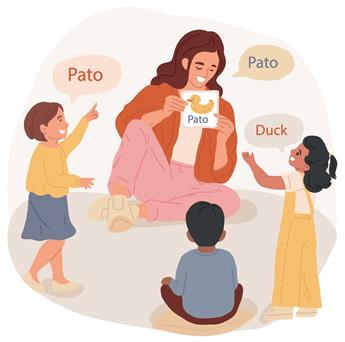Return to Bilingual Education
By Ester de Jong
 “In this excerpt from Foundations for Multilingualism in Education: from Principles to Practice (Caslon, 2011), Ester de Jong shares an overview of the history of language policy in the United States. ‘Return to Bilingual Education’ explores the 20th-century language policies that emerged after World War II, early bilingual education programs, and the Bilingual Education Act of 1968.”
“In this excerpt from Foundations for Multilingualism in Education: from Principles to Practice (Caslon, 2011), Ester de Jong shares an overview of the history of language policy in the United States. ‘Return to Bilingual Education’ explores the 20th-century language policies that emerged after World War II, early bilingual education programs, and the Bilingual Education Act of 1968.”
Because of legal restrictions on immigration that began in WWII, and the resulting decrease in newcomers to the country, anxiety regarding their assimilation fell, and policies in education began to change towards pluralism. This was furthered by the Brown v. Board of Education Supreme Court case in 1954. WWII also brought the realization of the need for the study of foreign languages.
In the 1960’s, a school in Miami experimented in Bilingual education as enrichment for both native English speakers and Cuban immigrants. However, when this expanded to other locations, the goal was assimilation.
The Bilingual Education Act was passed in 1968 to mitigate the poor performance of non-English speaking children in schools. However, its purpose was remediation. This changed in 1974 when the BEA was reauthorized and defined bilingual education as teaching students in their native languages so they could progress in their schooling. Education policies are controlled by the states, so “if states or districts want the money, they have to meet the federal requirements. Under the BEA, districts had to implement bilingual education programs for the specified target groups in order to receive federal funding. It thus provided an incentive for districts to consider bilingual instruction options.”
The 1974 and 1978 reauthorizations provided bilingual education only for students who did not speak English. In 1984 and 1988 bilingual education was considered a failure, so additions to the BEA allocated funding for non-bilingual programs with the goal of mainstreaming MLs as quickly as possible. The reauthorization in 1994 “funded bilingual programs aimed at language maintenance and development and focused on content as well as language and literacy development.”
In 2001, the BEA was replaced by No Child Left Behind with the goal of successfully mainstreaming “limited English proficiency students”. Students’ home languages are only supported through Title VII of the BEA.
See the article for a list of changes in the BEA and a second list of related federal laws.
In related information, you can also read about the failure of English-Only Education Laws in various states and the repealing of those laws as well as states that have made English their official language. Also included are states with Bilingual Mandates, Multilingualism/Bilingualism Initiatives, Bilingualism Value Statements, Dual Language Initiatives, and the Seal of Biliteracy. You can find this on New America’s website.
On a related link, New America posted that In February, 2023, “the Biden Administration released its proposed budget for fiscal year 2024 which included $1.2 billion to support the education of English learners/multilingual learners (ELs/MLLs) through Title III.” As a result of this, some states have proposed additional beneficial legislation.


